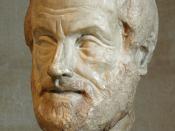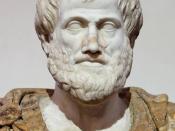Aristotle
Essay written by: Benito_mitchell
Aristotle (384 BC -322 BC) was a Greek philosopher, logician, and scientist. Along with his teacher Plato (author of The Republic), Aristotle is generally regarded as one of the most influential ancient thinkers in a number of philosophical fields, including political theory. Aristotle's' writing reflects his time, background, and beliefs.
Aristotle was born in Stagira, Macedonia. His father, Nichomacus, was the personal physician to the King of Macedonia, Amyntas. At the age of seventeen, Aristotle left for Athens to study at Plato's Academy. He studied at Plato's Academy for about twenty years, up until Plato's death. Soon thereafter, Aristotle went to a city in Asia Minor, called Assos, where his friend, Hermias was ruler (Encyclopaedia Britannica). It was in Assos where Aristotle met Pythias, who is described as either a niece or daughter of Hermias. Aristotle married Pythias after the murder of Hermias by the Persians.
Aristotle then went to Pella, the capitol of Macedonia, where he became the tutor for the king's son, Alexander, who later became Alexander the Great.
When Alexander became King, Aristotle went to Athens where he began to lecture at the Lyceum. Aristotle lectured while walking about in one of the Lyceum's covered walkways, which earned him the nickname "Peripatetic", which means walking about. Aristotle lectured and directed the Lyceum for twelve years, producing many the lecture notes, which now form his work. Only a small amount of Aristotle's work has survived. Some of Aristotle's writings which did survive are: "Metaphysics" which were his writings on the Nature, Scope, and Properties of Being; and "Physics" his writings on Astronomy, Meteorology, Plants, and Animals. These writings have changed the way the modern world thinks and lives. Aristotle's works encompassed all the major areas of thought, which...


